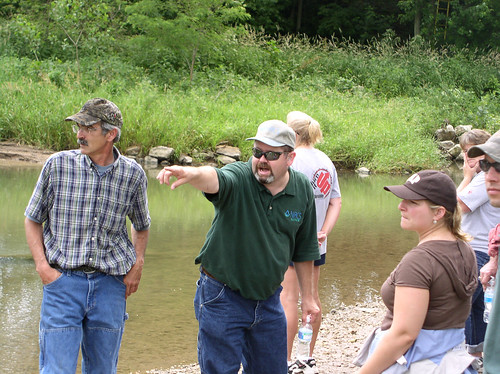
Rivers are special places, and for me, the Illinois and Macinaw rivers in central Illinois are my special places. Both rivers eventually send their waters to the Mississippi River, and the area provides habitat for wildlife as well as recreational opportunities like hunting and fishing.
But the rivers suffer from streambank erosion, soil erosion, sedimentation and nutrient runoff. We all hear about the hypoxic zone in the Gulf of Mexico at the mouth of the Mississippi, which is caused by high levels of nutrients in the water.
Water quality is important to me as a conservationist and motivates me as a conservationist. I am interested in conservation and wildlife habitat – both as a citizen that enjoys the outdoors as well as my job as a district conservationist in Tazewell County, Ill. with USDA’s Natural Resources Conservation Service (NRCS).
At NRCS, I work with local landowners, farmers, levee and drainage districts, and local highway departments to address resource concerns on their property, including erosion, and keeping sediment and nutrients on the land and out of waterways. Nutrients include nitrogen and phosphorous, common fertilizers as well as animal waste. Sediment is eroded soil, and it often carries nutrients with it.
Conservation practices, such as grassed waterways, grade stabilization structures and terraces, can help prevent runoff. Conservation programs provide technical and financial assistance to help put these practices on the ground. These conservation practices not only help the environment but the agricultural operation, too.
For example, we work with farmers on comprehensive nutrient management plans, which is an all-inclusive strategy that looks at all aspects of a livestock operation from the amount of manure generated to the amount of waste storage available on the farm. A nutrient management plan identifies cropland acres where this manure can safely be spread and utilized.
When we first started promoting these plans in 2003, we reached out to livestock producers that we may not have worked with in the past.
I remember a swine operation that had trouble controlling animal waste near the Mackinaw. I approached them to see if they were interested in a comprehensive nutrient management plan. At that time, he was not interested. A short time later, his brother-in-law and business partner, decided it would help their farm and protect the nearby river. They put in a number of practices that managed the waste and kept it from washing downstream.
It is neat to have new conservation opportunities come about to help people make positive improvements to the land. And the good news, those opportunities continue to grow. The 2014 Farm Bill created a new program, called the Regional Conservation Partnership Program. This program brings in assistance from partners to help get more conservation on the ground.
The program focuses part of its funding on eight critical conservation areas, including the Mississippi River basin. I am happy to hear of the continued investment in the basin, as the river – and the many rivers that form it – are an important ecosystem.
The Mississippi River’s tributaries in Illinois, including the Illinois and Mackinaw rivers, are an important part of my life. It is a flyway for migrating waterfowl and an opportunity for duck and goose hunting. I take my 15-year-old son, Kole, hunting for duck and squirrels in the wetlands and forests along the Mackinaw and Illinois.
It is great to have a job that makes a difference working with these farmers who help protect the waterways in the Mississippi River basin. They are eager to practice conservation on their land and willing to listen to technical advice when they have me out on their farms.
